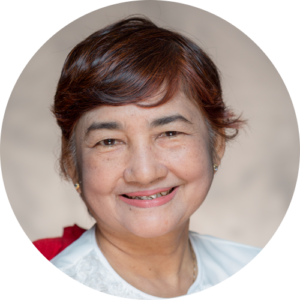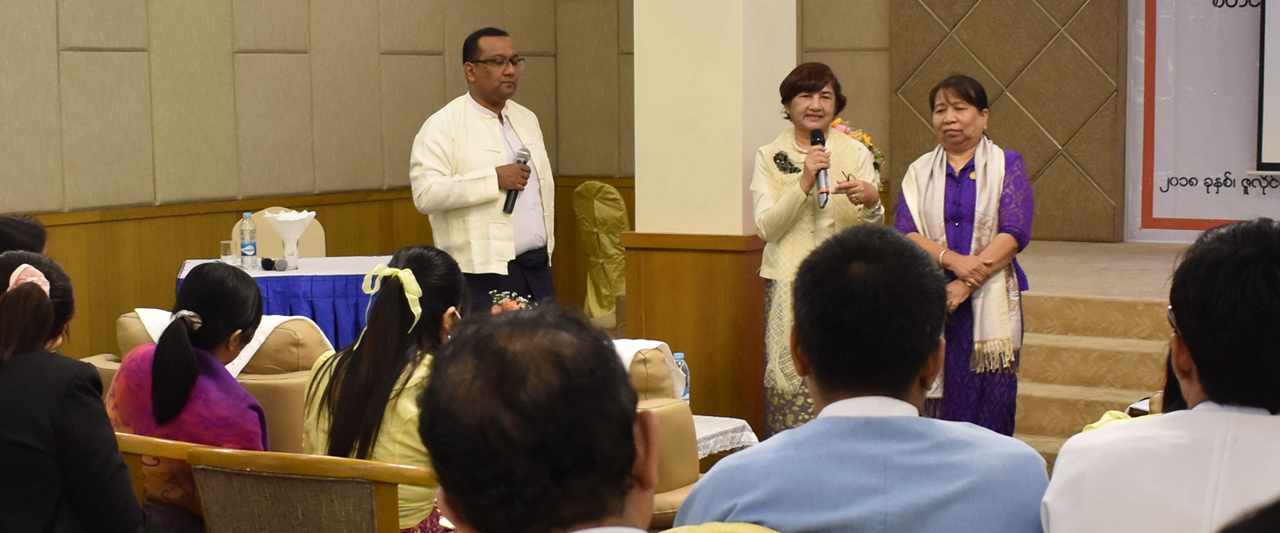Ipas Myanmar Country Director Ni Ni on working in a restrictive environment

Ipas Myanmar Country Director, Dr. Ni Ni
In Myanmar, where abortion is only permitted to save the life of a woman, unsafe abortion is the second leading cause of maternal death. The restrictive environment can slow progress to increase access to safe abortion and contraceptive care.
But Ipas Myanmar Country Director Ni Ni, who joined Ipas in 2014, is undeterred. “Even though it is difficult, I am very much dedicated to this work,” she said. “We need to empower women. We need to give them knowledge on their rights. We were under military regime for a long time, but with this new government, there is an opportunity to increase people’s knowledge of their rights—human rights, and sexual and reproductive health and rights, too. When people are empowered, they know their rights and can claim them.”
A medical doctor by training, Ni Ni previously worked at the Ministry of Health (MOH) for 17 years, which makes her uniquely positioned to work in a restrictive environment. She still has contacts and friends there, but because of the environment, “people are reluctant to help me, even if they want to.” For 11 years, she also taught social and preventative medicine at University of Medicine in Yangon, and many MOH officers and senior officials are her former students. “But even though they were my students, I have to be very careful. Some are supportive; some are not supportive. I always respect the authority of their positions. And I look for other champions.”
Below, Ni Ni shares the challenges of working in a restrictive environment, stories from her experiences in the field—and why she’s hopeful for continued progress.
A restrictive environment
In 2015, Myanmar—which had been under a military junta since 1962—had its first openly contested election since the early 1990s. The National League for Democracy won, theoretically meaning the country would transition to a democracy—though the military still holds a tight grip over policy and decision-making. But the election did lead to “a little bit more freedom,” Ni Ni said.
“It is still difficult,” says Ni Ni, “but not compared to the previous government.” And the crippling bureaucracy and a rigid hierarchical system further slows progress. Every activity Ipas Myanmar undertakes—from workshops and
trainings to medical monitoring visits—requires approval from the MOH. If something happens and the date is changed, the team must submit for a new approval letter.
Myanmar’s hierarchical system requires someone with seniority—Ni Ni, or one of her managers—to be present when activities happen in the field, though field coordinators are all doctors. So Ni Ni makes frequent trips to health facilities. “In the field, I see a lot of septic induced abortion cases. Often, when there is a PAC training, the doctor will say, ‘Today, I’m so sorry, there was a septic abortion case. She passed away.’ When women arrive with septic abortion, it’s often too late. There was even a case where a midwife, who was lacking proper knowledge of safe abortion services, died due to induced septic abortion.”
Ni Ni described health centers as being “overcrowded, overburdened and overworked,” lacking in manpower and equipment. “Like many developing countries, our government prioritizes other development projects, even in the health sector, where reproductive health is often underfunded. But there are a lot of things to improve at the health facilities level.”
Unsafe abortion in Myanmar
Ni Ni knows up close the harm of unsafe abortion. During her medical training, she encountered a 14-year-old girl who had a septic abortion. Her parents had helped her to induce an abortion and she came to the hospital very late. She survived, but she needed a hysterectomy.
When Ni Ni visits hospitals, the caseloads—especially in maternity/ob-gyn wards—are mostly of unsafe abortion. “Young girls do not have knowledge, especially around sexuality and abortion. A lot of girls die due to unsafe abortion. That’s why it is important to get safe abortion services in Myanmar: there will be a reduction in maternal mortality.”
A postabortion care (PAC) study conducted by Ipas Myanmar examined cases of induced abortion and how long it takes people to arrive at the hospital. “Often when people get to the hospital, it’s already late. People don’t know the symptoms and complications of unsafe abortion—they think it will resolve on its own.”
In the study, only 13 people—from 406 participants across 21 sites—used misoprostol to induce an abortion. “When they come to the hospital, it’s usually because they put something in their uterus,” Ni Ni said. Many use a type of tree bark, which can cause sepsis.
An issue of rights
Poverty, low literacy, a lack of education—including comprehensive sexuality education—and religious and cultural norms mean that many people “don’t know their rights or how to claim them.” And after decades under a military regime, “most women in Myanmar still are unaware of their human rights,” Ni Ni said. “Only now, with this current government, have they started learning about their rights. But even educated people are not aware of sexual and reproductive health and rights (SRHR).”
Looking ahead
Ipas Myanmar has made slow but steady progress since the change in government. With allied international non-governmental organizations (INGOs), the World Health Organization (WHO) and the United Nations Family Planning Association (UNFPA), Ipas Myanmar advocated to allow for safe abortion in cases of rape and incest during the Reproductive Health Policy Revision in 2017 and 2018. The Ministry of Health and Sports included this in its revised Reproductive Health Policy, which is set to launch soon.
Ni Ni sees “an opportunity for safe abortion. It might take a long time—because of religion, because of the political situation. There are groups who oppose this issue tooth and nail, even if there were to be any support within the government. There will be difficulties. But bit by bit, there will be safe abortion… It takes time, but we are educating people about safe abortion. Within 10 years, I hope things will improve.”
For more information, contact [email protected].


